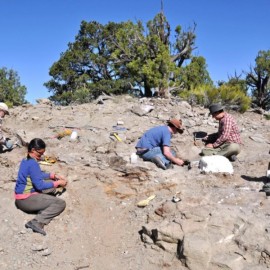This Ancient Giant Armadillo Is Responsible For Giving Us The Avocado
But not just this giant armadillo. Giant sloths, four-tusked elephants, and a whole bunch of other ancient mammals that roamed the earth over 10,000 years ago also all played a role. Over at National... READ MORE
Great whites may have wiped out the biggest shark that ever lived
The megalodon — also known as the biggest shark ever — became extinct a million years earlier than previously thought, due to competition from much smaller great white sharks, according to new research.... READ MORE
Meet the ‘Antarctic king,’ an unlikely fossil from 250 million years ago
Wildlife in Antarctica conjures up images of penguins, seals and other animals who have adapted to survive in such a harsh, frozen environment. But researchers have made an unexpected discovery that pulls back... READ MORE
Fossil turtle didn’t have a shell yet, but had the first toothless turtle beak
There are a couple of key features that make a turtle a turtle: its shell, for one, but also its toothless beak. A newly-discovered fossil turtle that lived 228 million years ago is... READ MORE
Newly discovered armored dinosaur from Utah reveals intriguing family history
Fossils of a new genus and species of an ankylosaurid dinosaur — Akainacephalus johnsoni — have been unearthed in the Kaiparowits Formation of Grand Staircase-Escalante National Monument (GSENM), in Kane County, southern Utah, U.S.A., and... READ MORE
Ancient skull shows early ‘baleen whale’ had teeth
Today’s baleen whales (Mysticetes) support their massive bodies by filtering huge volumes of small prey from seawater using comb-like baleen in their mouths much like a sieve. But new evidence reported in the... READ MORE
Jurassic fossil tail tells of missing link in crocodile family tree
A 180-million-year-old fossil has shed light on how some ancient crocodiles evolved into dolphin-like animals. The specimen — featuring a large portion of backbone — represents a missing link in the family tree... READ MORE
127-million-year-old baby bird fossil sheds light on avian evolution
The tiny fossil of a prehistoric baby bird is helping scientists understand how early avians came into the world in the Age of Dinosaurs. The fossil, which dates back to the Mesozoic Era... READ MORE












